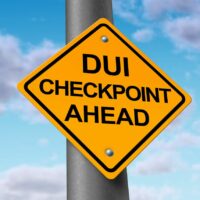Can You Refuse a DUI Checkpoint?

As a general matter, police officers must have a reason for pulling you over. They cannot simply decide to make a traffic stop on a whim. There are certain exceptions to the general rule, however. In California, police set up checkpoints to check for drunk drivers, and they ask drivers to stop even without suspicion of any particular crime being committed. Are such checkpoints legal? Do you have the right to refuse to stop at a DUI checkpoint? Read on to learn about your rights at a DUI checkpoint, and contact seasoned Oxnard DUI/DWI defense attorney Paul Tyler with any questions about how to deal with an arrest, criminal charge or record of conviction.
DUI Checkpoints Are Not Unconstitutional
First of all, it is perfectly legal for the police to set up a DUI checkpoint in California. Courts have ruled that DUI checkpoints count as “administrative inspections,” much the same as the checkpoints you endure at the airport before boarding a flight. You cannot simply refuse to comply by claiming the stop itself was unconstitutional.
That said, law enforcement officers must comply with certain rules and procedures in order to set up a valid checkpoint. The checkpoints must be official and must be officially established through the authority of a police supervisor. They must be clearly marked, they must be advertised in advance, and they must be applied neutrally to all motorists who come through. The checkpoint cannot be used to, for example, target drivers of a particular race.
It’s Not Illegal to Avoid a Checkpoint
If you see a checkpoint, you are legally allowed to take proper, legal steps to avoid the checkpoint. For example, you can take a turn down a side road. You must still obey all traffic laws when doing so. If you make an illegal U-turn, for example, or drive over the median, the police can pull you over on that basis and initiate a DUI check anyway. Even if you are sober, you could wind up with a traffic ticket for the illegal maneuver.
At a DUI Checkpoint, You Must Comply With Certain Requests
If you do drive up to the checkpoint, you are legally required to stop and comply with certain requests issued by the police. The police will ask you to stop your vehicle and provide the officer with proof of your license, registration, and insurance. You must comply with these base-level requests. They will also ask you to answer questions regarding alcohol consumption.
You do not, however, need to comply with all requests. You are not required to submit to a warrantless search of your vehicle. Although they can ask you about alcohol consumption, you can refuse to answer. You have the constitutional right to refuse to answer a question that might incriminate you–such as admitting to having consumed alcohol. If they see something that gives them suspicion of a crime–such as an open bottle of alcohol in view of the officer from outside the vehicle–then they can arrest you or conduct a search.
You May Have the Right to Refuse a Sobriety Test or Alcohol Screening
Police do not typically perform BAC (blood-alcohol content) tests on everyone at a DUI checkpoint. If they ask you to submit to a breathalyzer or to perform a field sobriety test, you are legally allowed to refuse unless you fall within an exception. Certain drivers cannot legally refuse the test, including:
- Drivers under the age of 21
- Drivers currently on DUI probation
- A person who has been legally arrested
Refusing the tests under these circumstances can lead to enhanced penalties, especially if the driver is later convicted of DUI.
Call for Help After a DUI Arrest in Oxnard or Ventura County
If you are facing criminal charges in southern California, get seasoned and effective legal help by contacting the Ventura offices of Paul Tyler for a free consultation at 805-889-9000.
